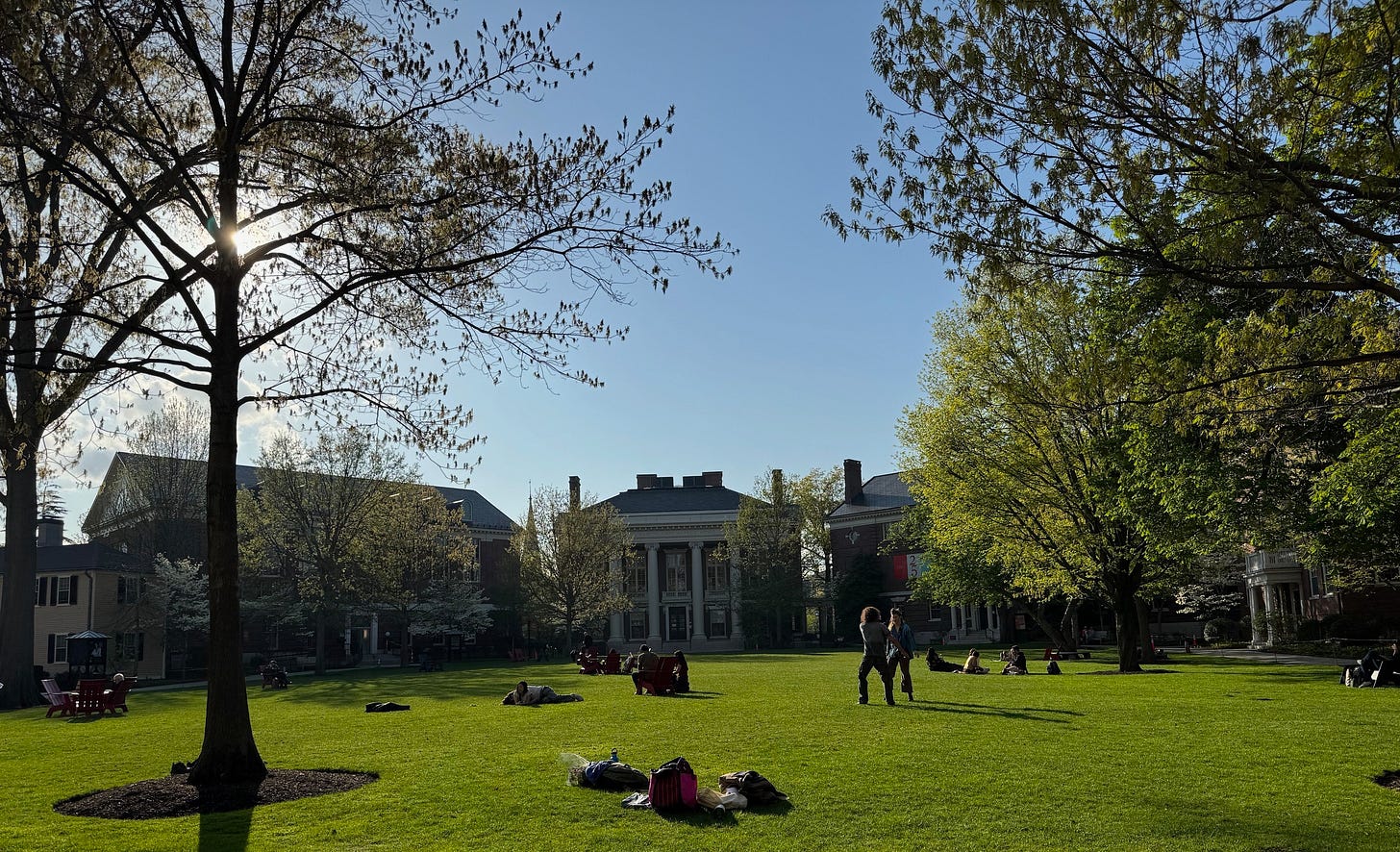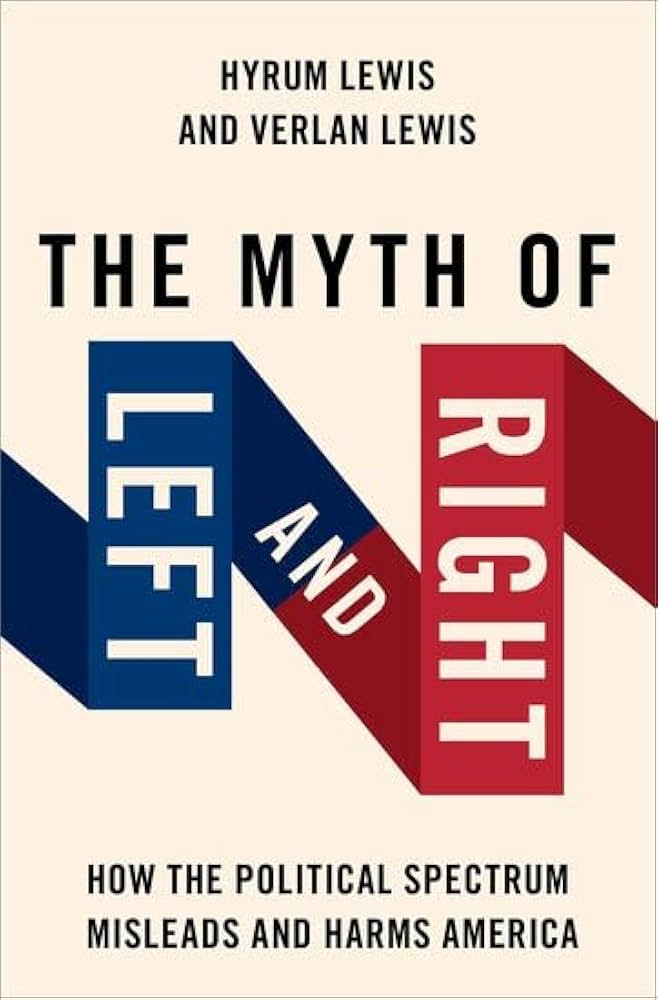👁️ Top Insights #133 - Harvest from Harvard, A Decade of Transformation & Moving Beyond Polarization
Reflections on the Meta-Crisis conference, 10 years of transformation, how to do politics better, untimely deaths and timeless insights.
“Top Insights” is a monthly newsletter that shares mind-expanding podcasts, transformational frameworks, and insightful links that help you go beyond conventional development.
Welcome to the June 2025 Edition of Top Insights ☀️
May the longer days of summer bring you joy, vibrance, and deep contentment.
Harvest from Harvard 🌽 🏫
This past month, I attended the Human Transformation in a Time of Meta-Crisis conference at Harvard.
I thoroughly enjoyed the event and want to thank the organizers—School Founders of the World &
—and the host for doing an immaculate job facilitating the conference.My biggest highlight was finally meeting many of my online friends and collaborators in person, as well as connecting with other thoughtful, curious minds who are deeply immersed in vitally important inquiries.
Day 1 - Conference
The first day was filled with presentations and panel conversations.
The presentations were a hit or miss and, for the most part, didn’t spark much inspiration in me.
The panels, while well-meaning, leaned too heavily on agreement with too much back-patting and head-nodding, and not enough dialectical tension or diversity of thought.
One speaker suggested that transforming education requires two things:
Less top-down instruction and more self-directed learning
Getting kids out of the classroom and into nature
Ironically, we were listening to that message indoors, in a very conventional, lecture-style format.
Afterward, I had lunch in the courtyard, soaking in the beautiful weather and decompressing from the morning's sessions.
In the afternoon, I joined a workshop titled Awake in the Danger Zone with
and . In this session, we were prompted to imagine civilizational breakdown—not just as a concept, but as an embodied reality.The image that surfaced for me was of people knocking at my door due to widespread shortages of food, water, and shelter. This brought up the inquiry of: How do I protect my family while keeping my heart open to the broader world?
Afterward, I grabbed some snacks and chatted with people in the courtyard before heading into Zak Stein’s talk on AI. I missed the presentation but caught the Q&A. Despite sitting near the stage, it was hard to hear Zak—whether it was a mic issue or a lack of voice projection, I’m not sure, but it was frustrating given how meaningful his contributions always are.
It reminded me of a podcast I recorded with Forrest Landry—another profound thinker in the liminal space—whose insights were undermined by poor audio quality. This seems to be a pattern: some of the wisest people pour themselves into content and substance, but neglect delivery and presentation. As a result, they often get overshadowed by flashier, more polished voices with far less depth.
Substance should be primary, but if it’s not presented well, it won’t generate the reach or impact that is necessary. Interestingly, the speaker after Zak had strong vocal projection but came off as overly heady and disembodied, illustrating that delivery alone isn’t enough either.
The day closed with a beautiful concert featuring several talented musicians and vocalists. It was a welcome rebalancing of what had felt like a left-brain dominant environment.
Post-conference, many of us lingered in the courtyard, reflecting on the day. My favorite part was dinner, where good food, intimacy, and intellect weaved seamlessly together.
Day 2 – The Unconference
The second day was the participant-created unconference.
I started with a 3-hour session on Meta-Crisis Assessment and Yellow Teaming hosted by Chris Eddy and Zak Stein. Chris, a student of Zak’s, gave a detailed overview of the meta-crisis landscape and existential risk.
We then split into small groups to apply the Yellow Teaming methodology to a project of our choice. My group explored second and third-order consequences of self-driving cars.
For context:
Red Teaming identifies weaknesses in an opponent’s system
Blue Teaming defends your own system from attack
Yellow Teaming explores unintended consequences—long-range risks and blind spots in your strategy
After lunch, I joined a session titled Oracular Bodies: A Phenomenological Soul Study of Oracular Being with Cheryl Hsu and Cassie Robinson. The session explored oracular perception—the ability to channel or feel into subtle, often ineffable layers of reality. It was about honoring intuitive, liminal forms of knowing, which are often overlooked and devalued in modern systems.
We were invited to access and speak from our own oracular awareness. My stomach was off, and I was feeling tired, so I didn’t share or engage as much as I would have liked.
We finished the session by sitting around a beautiful mandala created by one of the participants as a part of a ritual to acknowledge and honor the water streams of New England. This session had a distinctly different energy from the rest of the conference—mysterious, ritualistic, and deeply relational.
The final session I attended was The Meaning Crisis: What It Is, Where It Comes From, and How Educational Initiatives Can Respond, led by
and Kam Bellamy.Brendan offered a clear overview of the meaning crisis, followed by Kam’s presentation on Springhouse, a learning initiative that responds to the meaning crisis by creating micro-colleges—small, alternative educational models rooted in mentorship, community, practical skills, and inner development.
I left this session genuinely hopeful that the education system can evolve in ways that are both more human and more transformative.
After the unconference, a small group of us grabbed dinner at an indian restaurant. It was good to meet some new faces and to get to chat more with my fellow podcaster and liminal explorer, Brendan Graham Dempsey. Later, we linked with a larger group of participants from the conference and chatted for several more hours at a coffee shop/lounge before retreating for the night.
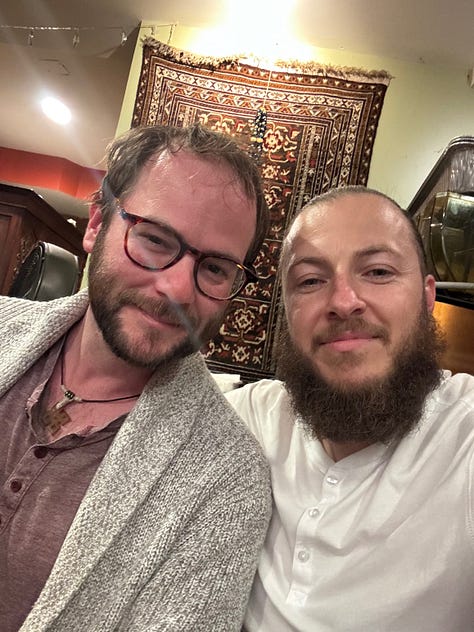
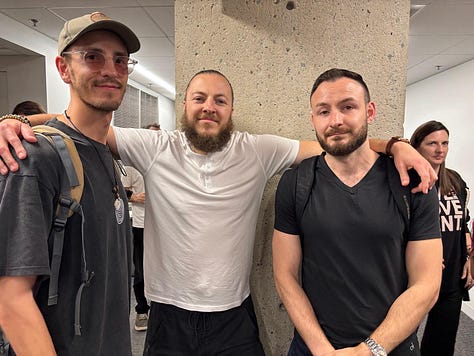

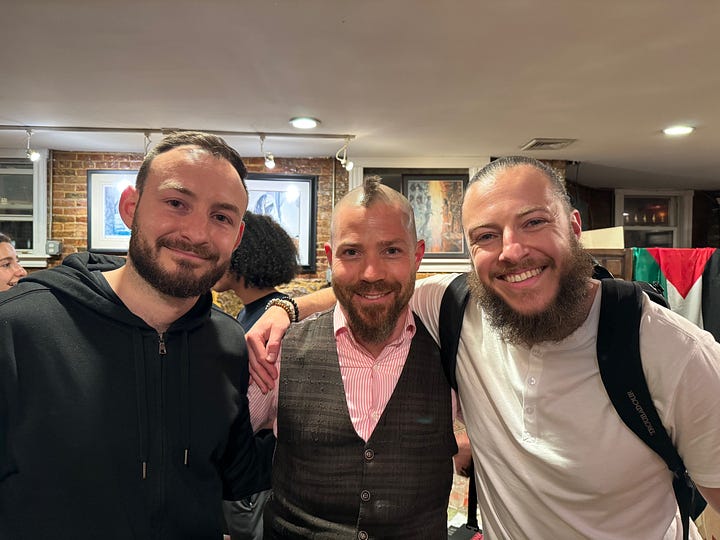

Closing Reflections
One theme that kept emerging was the tension between Harvard as an institution and the liminal web. The fact that meta-crisis discourse is showing up at Harvard at all is, in itself, a big win. But it’s still unclear whether traditional institutions based in legacy systems can contribute meaningfully to transformative change.
Patience is needed. Ideas often take time to penetrate culture. For those of us who’ve been steeped in these conversations for years, some of the conference content may have felt shallow. But for others, it may have been a first encounter, an important step in the unfolding.
Another thread was my desire to hear more discussions between people with contrasting views. Many of the conversations were marked by consensus, but if we want to discover novel insights, we need more dialectical tension between thinkers.
What about getting a techno-optimist in conversation with a meta-crisian? I’d love to hear—or better yet, facilitate—a dialogue between Naval Ravikant and Daniel Schmachtenberger.
Finally, I’m left with the sense that the most vital change won’t be initiated through conferences, podcasts, or Twitter threads but from small grassroots communities.
Spaces where people gather to engage in good-faith dialogue while solving problems together.
Because true transformation happens not on polished stages but in the soil of honest, grounded, and gritty relational work.
A Decade in Transformation 🔟 🦋
Yesterday I turned 37, which feels like a rather insignificant age; however, as I reflected, I realized it’s been nearly a decade since I became committed to the path of transformation.
It feels fruitful to look back at the significant milestones and events of the last 10 years of my life journey.
2015 - The peak of my rapping days. Consumed with writing, recording, and performing. Obsessed with fashion and hanging out in Soho. Chasing the dream, living the rap star lifestyle. Not yet immersed in personal growth, but something was starting to wake up inside. My girl and I take a break, but eventually get back together.
2016 - Due to life circumstances and financial pressures, I realize I need to pursue other avenues aside from rap. I start personal training clients and selling private label products on Amazon. I start meditating daily and having a consistent morning routine. Last time drinking hard liquor. My rap dreams start to dwindle away, culminating with some final performances. I propose to my girl.
2017 - Psychedelic season begins. I drink ayahuasca for the first time, heart breaks open. Move out of my parents’ house. Start intermittent fasting daily. Attend several personal growth retreats and events. Trip to Paris & Amsterdam. Experience 5-me0-dmt for the first time, was that God? Start attending Toastmasters public speaking meetups. Grandpa dies. A month later, Grandma dies.
2018 - Attend Business Mastery with Tony Robbins. Start hosting personal growth meetups and dinners. Do a lot of other business and marketing trainings. Take mushrooms and grieve the loss of my grandparents. Attend a movement training with Ido Portal in Boulder. Use 5-MeO-DMT a couple more times. Get married in Santorini. Honeymoon in Italy. Yoga retreat in Thailand. Dark night territory.
2019 - Welcome, my first son, spend much of the year adjusting to Dad life. After several years of not releasing music drop “Please love yourself” music video. Read “Mastering the Core Teachings of the Buddha” by Daniel Ingram and finally get a sense of what this meditation path is about. Host more personal growth meetups. More learning, reading, and working on my business.
2020 - Attend a 4-day Zen retreat. Covid breaks out, a lockdown ensues. Release another song & music video, “Woke Up Rich.” Win Toastmaster’s best speech at the club level. Spend a lot of time creating & launching products. Writing & recording some more.
2021 - Welcome my second son and enter the two-under-two parenting stage. Spend ten days living and training at a modern-day monastery. Learn the relational practice of Circling. Get Co-vid, which creates a freak reaction in my body, making it difficult to walk. Start psychotherapy. Launch my podcast, hosting Daniel Ingram on the first episode. Take an online meditation retreat with Dan Brown and Dustin DiPerna. Close down my e-commerce business. Start working with my wife on her psychotherapy group practice.
2022 - Spend much of my time & energy trying alternative treatments to resolve my health condition. Start physical therapy. Experience new levels of grief and gratitude. Take the 6-month SAS Circling facilitator training. Get stem cell treatment in Panama, it doesn’t end up working. Close on a house. More parenting & podcasting.
2023 - Take the 8-month Aletheia Coach training program. More physical therapy now with my cousin. Start working with coaching clients. Even more parenting & podcasting. More grief around my condition. Hosting some Circling events online and in person.
2024 - Six day meditation retreat at a Buddhist temple. Increasingly feel myself growing apart from many friends. Two-day Evolving Ground retreat in NYC. Three-day Working with Emotions retreat with Lama Lena. Move into new house. Even more grief around my condition. Two-day shadow workshop with Charlie Awbery. Expenses are growing, trying to figure out how to make more money. Six-day intermeditate mahamudra retreat with Dustin Diperna.
2025 - Attend Jim Newman Non-duality meetup. Take on an additional role at the psychotherapy practice. Host some more Circling sessions online. Trip to Disney & Universal Studios with the kids. Attend the Human Transformation in a time of Meta-crisis conference at Harvard.
Well, there you have it, 10 years condensed into 10 paragraphs.
I enjoyed walking down memory lane and will probably do a more detailed post on this in the near future.
If you want to do a similar reflection, I highly recommend going through past photos, as they help bring memories back to life.
Elevating Consciousness Podcast 🎙
In case you missed them, below are the podcast episodes I released last month.
Why You’re Not Actually Liberal or Conservative with Hyrum Lewis - Hyrum Lewis is a professor, author, and political theorist. He is also the author of several books, including his most recent, The Myth of the Left and Right, co-authored with his brother Verlan Lewis. In it, they argue that the traditional left-right political spectrum is a misleading and oversimplified framework for understanding contemporary American politics. In this episode, we speak about why tribalism precedes philosophy, how what left and right means is always changing, what Jonathan Haidt got wrong, pathways towards more generative political conversations, and the relationship between religion and politics.
The Journey from Avoidance to Deep Intimacy - Daniel Thorson is a former monastic, podcaster, writer, and coach. He spent five years as a resident at the Monastic Academy and has accumulated two years of silent retreat experience. He also writes The Intimate Mirror on Substack, a publication exploring meaning, transformation, intimacy, and the search for religion in the age of Artificial Intelligence. In this episode we speak about Daniel’s extensive experience living and training at a Monastery, turning break downs into break throughs, developing a better relationship with conceptuality and rationality, secure attachment with reality, leaving Buddhism, creating a Dharma capable of addressing the meta-crisis and many other resonant threads on personal and collective transformation.
Insightful Links 🔗
Final Dharma talk by Ralph De La Rosa - This past month, psychotherapist and meditation teacher Ralph De La Rosa suddenly passed away at the way too young age of 48. I was just in the middle of their phenomenal book “Outshining Trauma,” which integrates IFS (parts work) with meditation, and had them on my list of people whom I wanted to host on the podcast. In honor of this beautiful being, here is their final Dharma talk, which ironically is titled “Closing the circle.”
Life lessons from facing death - This video from The Art of Accomplishment features a heart-opening account from Michael Nagel — a man facing colon cancer and uncertainty around how much time he has to live. We often take our lives for granted because it’s hard to touch into our own mortality. It is stories like Michael’s that open us to the impermanence of our lives, along with a sense of grace, gratitude, and wonder.
Ocean of Elephants: Embodiment, Trans Women & Digital Otherworlds by Alexander Beiner - An insightful piece from Ali that explores the growing cultural tension between abstraction and embodiment, arguing that many modern crises—from gender debates to political polarization—stem from over-identifying with abstract ideas while becoming disconnected from physical, biological, and relational reality.
Resonant Read 📕
“The Myth of Left and Right” challenges the widespread belief that the traditional political spectrum reflects a coherent set of ideological principles. Instead, Hyrum and Verlan Lewis argue that what we call “left” and “right” are not consistent philosophical systems, but shifting tribal identities. Most people don’t arrive at their beliefs through reasoned ideology; they adopt the views of their political tribe and then rationalize them afterward. This essentialist myth of a unified left or right obscures the real dynamics of American politics, deepens polarization, and prevents a more nuanced, issue-by-issue understanding of political behavior.
Here are my top 20 insights from the book:
The myth of left and right is the false belief that there is an essence behind the political spectrum.
This belief is perpetuated by the essentialist theory of ideology, which says that all political issues cluster and grow around one main issue.
An example of this kind of thinking is believing that if someone votes pro-choice or anti-war, then they are left-wing, and if they vote pro-life or pro-war, they are right-wing.
The essentialist theory says all left-wing positions prompt change, while all right-wing positions resist or attempt to reverse change.
The Social Theory of Ideology contrasts with the Essentialist theory because it claims that political positions aren’t bound by one main issue but instead by a unified tribe.
Contrary to what many people believe, our philosophy doesn’t precede our tribe. People first anchor into an ideological tribe (due to factors like family, peers, or a single strong issue), adopt the positions of that tribe through socialization, and only then create a narrative or "philosophy" to tie those positions together.
The Essentialist perspective sees right-wing as opposing change, yet Hilter long considered a right-wing dictator, stood for radical change.
People with varying political dispositions can be both for and against change depending on what the change entails.
People like to see the political spectrum as made up of two opposing qualities, such as compassion vs greed, collectivism vs individualism, democracy vs plutocracy, heart vs head, idealism vs realism, ignorance vs intelligence, poor vs rich, pragmatism vs dogmatism, secularism vs religiosity.
American Politics used to be unidimensional because it was concerned with one issue - how big government should be. But over time, especially with the rise of conservative militarism and hot-button social issues, that changed. Now, people's views on government depend on the issue but people still feed-into an outdated unidimensional model of politics.
Some researchers claimed that conservatives have higher levels of threat sensitivity. These studies failed to replicate because those who conducted them selected specific images that were more frightening to conservatives.
Follow-up studies showed a fairly equal response in fear both in conservatives and liberals and that threat arousal depended on the issue. Conservatives may have a higher level of threat to “Islamic Terrorism,” but liberals experienced a higher level of threat to “COVID-19.”
Despite the essentialist theory being described as a "simple lie", more educated individuals are more likely to think about politics in unidimensional "left" or "right" terms. This is because intellectuals are more skilled at using "system two" (deliberate) thinking to rationalize "system one" (intuitive or partisan) impulses. They can craft highly complex and compelling narratives to justify simple lies.
Essentialism persists because it’s an effective way to deny our tribalism. The problem of American politics isn't tribalism; it’s the fact that we don’t acknowledge our tribalism.
“If grocery stores required us to buy one of two baskets of randomly selected products, we would all choose the basket containing more of the products we preferred, but would do so without the illusion that all the products in our basket were better than all the products in the other basket. Unfortunately, when it comes to the “baskets” of politics (parties), we have invented ideological essentialism to delude ourselves into believing that every-thing in our political basket (party platform) is superior to everything in the other party’s basket.
“Our goal should not be to eliminate bias (impossible), but to reduce bias (possible); not to reach perfect objectivity (a “noble dream”), but to have more objectivity (a worthy goal).”
We need to replace ideology with granularity. “With granularity, we simply identify where someone stands in relation to a particular position (e.g., “pro- choice”) instead of trying to pin down their ideological label (e.g., “far left”). Instead of considering how people or parties have changed their relationship to an essence (“He moved to the left”), we should just consider how they have changed on individual positions (“He turned against the Iraq War”).”
“Instead of thinking in terms of left and right, we should think in terms of specific policies and ideas, such as “income tax increase,” “abortion rights,” “deficit reduction,” “affirmative action,” or “free trade.””
“Granularity improves civility as well as accuracy. Since essentialist categories are as inflammatory as they are vague, using them has the effect of generating more heat than light in political interactions.”
The terms “Republican” and “Democrat” are preferable to “conservative” and “liberal” because they refer to party affiliation rather than suggesting that a person’s entire worldview aligns with a fixed political philosophy
Follow up with my podcast with Hyrum Lewis.
Quintessential Quote ✍️
"Not everything that is faced can be changed. But nothing can be changed until it is faced."
— James Baldwin
Thanks for reading. If you enjoyed this read click the “Subscribe now” button below to subscribe. If you're already a subscriber, click the “Share Insighter” button to share with a friend or the “Leave a comment” button to share some thoughts.





